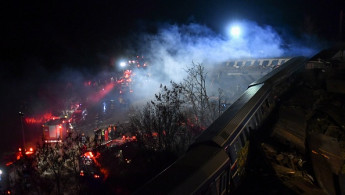Train accident in Greece kills at least 26
At least 26 people were killed and another 85 injured after a collision between two trains caused a derailment near the Greek city of Larissa late Tuesday night, authorities said.
A fire services spokesman confirmed that three carriages skipped the tracks just before midnight after the trains - one for freight and the other carrying 350 passengers - collided about halfway along the route between Athens and Thessaloniki.
"At least 26 people have been found dead so far," spokesman Vassilis Vathrakogiannis told a press conference, adding that efforts to rescue people still trapped were ongoing.
"Eighty-five people were injured and transported to nearby hospitals."
Greek media are calling the crash the "worst train accident that Greece has ever known".
About 150 firefighters and 40 ambulances were mobilised for the response, according to the Greek emergency services. Cranes and mechanical personnel were also deployed to try to remove debris and right overturned vehicles.
"The majority of passengers have been taken to safety," Vathrakogiannis said.
"The operation to free trapped people is underway and is taking place in difficult conditions, due to the seriousness of the collision between the two trains," he added.
According to public television station ERT, one of the train cars caught fire after the collision and several people were trapped inside.
At least 15 people are said to have died, dozens left injured after 2 trains collided
— Saad Abedine (@SaadAbedine) March 1, 2023
Witnesses in the aftermath of the crash near Tempe in Greece 🇬🇷 shortly after midnight on Wednesday described an intense fire on one of the carriages, with a large emergency response underway https://t.co/awJtLviS88 pic.twitter.com/i2YgdRznjz
An emergency government meeting was organised after the crash, and Greek health minister Thanos Plevris has gone to the scene while interior minister Takis Theodorikakos supervises the response from a crisis management centre.
According to Skai, the region's governor, Kostas Agorastos, announced that "more than 250 passengers were transferred to Thessaloniki by bus".
The two hospitals near Larissa have been requisitioned to accommodate the many injured, according to the fire services, while military hospitals in Thessaloniki and Athens are also "on alert" in case they are needed.





 Follow the Middle East's top stories in English at The New Arab on Google News
Follow the Middle East's top stories in English at The New Arab on Google News
![The UAE is widely suspected of arming the RSF militia [Getty]](/sites/default/files/styles/image_330x185/public/2024-11/GettyImages-472529908.jpg?h=69f2b9d0&itok=Yauw3YTG)
![Netanyahu furiously denounced the ICC [Getty]](/sites/default/files/styles/image_330x185/public/2024-11/GettyImages-2169352575.jpg?h=199d8c1f&itok=-vRiruf5)
![Both Hamas and the Palestinian Authority welcomed the ICC arrest warrants [Getty]](/sites/default/files/styles/image_330x185/public/2024-11/GettyImages-2178351173.jpg?h=199d8c1f&itok=TV858iVg)